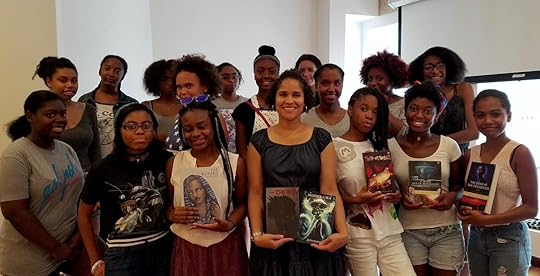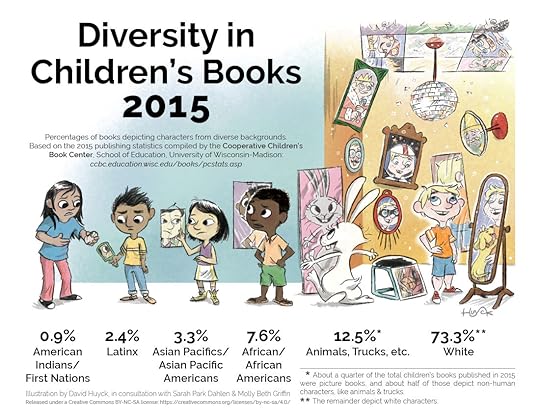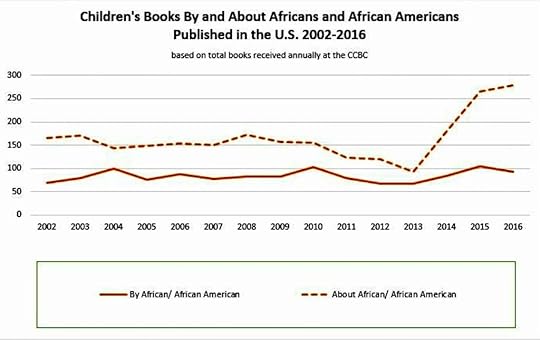Zetta Elliott's Blog, page 29
July 23, 2017
how to be happy
 Several years ago I started to think more about happiness. As someone who has lived with depression and anxiety since I was a teen, I worried that my mental health issues were preventing me from finding and/or experiencing joy. Then, when I started tracking my own happiness and found I was pretty happy much of the time, I started to worry about claiming an identity as a depressive. I’m high-functioning, highly productive and the past few years have probably been the happiest of my adult life. I still have blue days but I seem to have found the right balance—my anxiety pushes me to get things done but depression helps to slow me down, turn inward, and become more reflective. In 2015 I went to London for my birthday and couldn’t believe how happy I was to be alone in the city, doing research for The Ghosts in the Castle. Lately I’ve been thinking about the word “sovereignty” and this writer’s life provides so much autonomy—a key factor in my newfound happiness. Being a spinster suits me; I still think about having a family and raising kids but what makes me happy right now is being accountable to no one—making decisions based on what I need or want. Sounds selfish, right? I just booked another trip to London for my 45th birthday in October and I know most of the choices I make wouldn’t be possible if I had kids. I like being an aunty—having occasional contact with kids and minimal responsibility—and this summer I’m going to try to get up to Nova Scotia to see my nieces. Writing Aunt Joss in The Ghosts in the Castle was a lot of fun because she was a version of me: a single, middle-aged Black feminist professor who adopted a son with nerdy tendencies. Aunt Joss is still bitter about the way she was raised in the UK by her Caribbean parents and she’s determined NOT to pass imperialist ideas on to the next generation. When I finished presenting at the NCRCL in London last spring, the director of the center stood up and read a passage from Ghosts in which Aunt Joss complains to her sister about the problematic “classics” they read as kids—books that still hold appeal for contemporary kids. I was having a good writing day yesterday and it got even better when Debbie Reese posted a tribute on her blog to radical aunts. There are two aunts in Ghosts but only Joss is willing to break with tradition and challenge the conventions that harm our youth. Joss delivers a few mini lectures in the novel and Debbie appreciated the aunt’s role in telling the truth about colonization. How can you take a child to a museum and NOT talk about how all those artifacts were acquired? Please stop by American Indians in Children’s Literature to read her review of The Ghosts in the Castle and the latest Lola Levine novel by Monica Brown.
Several years ago I started to think more about happiness. As someone who has lived with depression and anxiety since I was a teen, I worried that my mental health issues were preventing me from finding and/or experiencing joy. Then, when I started tracking my own happiness and found I was pretty happy much of the time, I started to worry about claiming an identity as a depressive. I’m high-functioning, highly productive and the past few years have probably been the happiest of my adult life. I still have blue days but I seem to have found the right balance—my anxiety pushes me to get things done but depression helps to slow me down, turn inward, and become more reflective. In 2015 I went to London for my birthday and couldn’t believe how happy I was to be alone in the city, doing research for The Ghosts in the Castle. Lately I’ve been thinking about the word “sovereignty” and this writer’s life provides so much autonomy—a key factor in my newfound happiness. Being a spinster suits me; I still think about having a family and raising kids but what makes me happy right now is being accountable to no one—making decisions based on what I need or want. Sounds selfish, right? I just booked another trip to London for my 45th birthday in October and I know most of the choices I make wouldn’t be possible if I had kids. I like being an aunty—having occasional contact with kids and minimal responsibility—and this summer I’m going to try to get up to Nova Scotia to see my nieces. Writing Aunt Joss in The Ghosts in the Castle was a lot of fun because she was a version of me: a single, middle-aged Black feminist professor who adopted a son with nerdy tendencies. Aunt Joss is still bitter about the way she was raised in the UK by her Caribbean parents and she’s determined NOT to pass imperialist ideas on to the next generation. When I finished presenting at the NCRCL in London last spring, the director of the center stood up and read a passage from Ghosts in which Aunt Joss complains to her sister about the problematic “classics” they read as kids—books that still hold appeal for contemporary kids. I was having a good writing day yesterday and it got even better when Debbie Reese posted a tribute on her blog to radical aunts. There are two aunts in Ghosts but only Joss is willing to break with tradition and challenge the conventions that harm our youth. Joss delivers a few mini lectures in the novel and Debbie appreciated the aunt’s role in telling the truth about colonization. How can you take a child to a museum and NOT talk about how all those artifacts were acquired? Please stop by American Indians in Children’s Literature to read her review of The Ghosts in the Castle and the latest Lola Levine novel by Monica Brown.
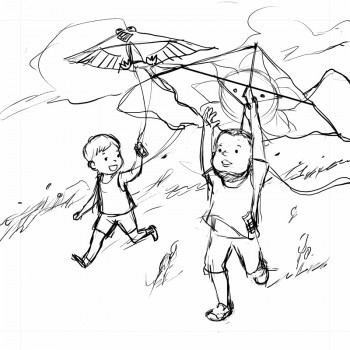 I’m averaging 500 words a day this weekend and that’s a good thing because I am FINALLY finishing the 3000-word story I was supposed to write back in March. I’m at 2600 words so I really need to tighten the narrative and use precise language. I took a week off after finishing The Return and it’s with a couple of editors now. My new picture book story is also under review and I was pleased to hear from a publisher in the UK who wanted to see some other manuscripts. Purple Wong has finished the preliminary sketches for Benny Doesn’t Like to Be Hugged and I’m pausing to get some feedback before we move forward with that picture book. And then on Thursday the summer issue of African Voices magazine came out—it includes an interview by Mariahadessa Ekere Tallie about my experiences within the kid lit community. You can find the digital edition here.
I’m averaging 500 words a day this weekend and that’s a good thing because I am FINALLY finishing the 3000-word story I was supposed to write back in March. I’m at 2600 words so I really need to tighten the narrative and use precise language. I took a week off after finishing The Return and it’s with a couple of editors now. My new picture book story is also under review and I was pleased to hear from a publisher in the UK who wanted to see some other manuscripts. Purple Wong has finished the preliminary sketches for Benny Doesn’t Like to Be Hugged and I’m pausing to get some feedback before we move forward with that picture book. And then on Thursday the summer issue of African Voices magazine came out—it includes an interview by Mariahadessa Ekere Tallie about my experiences within the kid lit community. You can find the digital edition here.
The summer’s disappearing before my eyes! Just six weeks until the start of September, which always signals the end of summer for me because I’m still on an academic calendar. I’ll be teaching a creative writing class on ghosts & portals for Uptown Stories at the end of August—if you know kids in or near Washington Heights, check us out!
July 12, 2017
Book of the Week!
 I’m having a great week! Yesterday I got to meet some impressive young women at the Octavia Project and today I learned that Milo’s Museum was selected as Book of the Week by Everybody Wins! DC. I said I was going to take a break from writing this week but there’s a short story I started last spring that just needs a bit more work…The Dragon Thief—sequel to Dragons in a Bag—is due October 1 so I’m not going to work on that other novella. I’ll do something short and quick and then start plotting this new book, which takes place in Brooklyn, Madagascar, and India…
I’m having a great week! Yesterday I got to meet some impressive young women at the Octavia Project and today I learned that Milo’s Museum was selected as Book of the Week by Everybody Wins! DC. I said I was going to take a break from writing this week but there’s a short story I started last spring that just needs a bit more work…The Dragon Thief—sequel to Dragons in a Bag—is due October 1 so I’m not going to work on that other novella. I’ll do something short and quick and then start plotting this new book, which takes place in Brooklyn, Madagascar, and India…
July 8, 2017
across the sea
 Three years ago I got my last PSC-CUNY grant and used it to fund a trip to Dakar, Senegal. Photos from that trip came up on Facebook this morning, which seemed fitting since I’m putting the finishing touches on The Return today. I still have quite a lot of fact-checking to do, and reached out to some groups in Senegal and Harlem, but the story is pretty much done. I’ve written quite a bit so far this year and still hope to finish two more novels this summer. I often move on so quickly that I forget about how my finished books are circulating in the world. But Jherane from the Rebel Women Lit book club in Jamaica reminds me that stories can cross seas. They’ll be reading Mother of the Sea this month and Jherane posted this photo on Instagram today. A perfect shot! So honored that they’ve chosen my novelette to read and discuss!
Three years ago I got my last PSC-CUNY grant and used it to fund a trip to Dakar, Senegal. Photos from that trip came up on Facebook this morning, which seemed fitting since I’m putting the finishing touches on The Return today. I still have quite a lot of fact-checking to do, and reached out to some groups in Senegal and Harlem, but the story is pretty much done. I’ve written quite a bit so far this year and still hope to finish two more novels this summer. I often move on so quickly that I forget about how my finished books are circulating in the world. But Jherane from the Rebel Women Lit book club in Jamaica reminds me that stories can cross seas. They’ll be reading Mother of the Sea this month and Jherane posted this photo on Instagram today. A perfect shot! So honored that they’ve chosen my novelette to read and discuss!
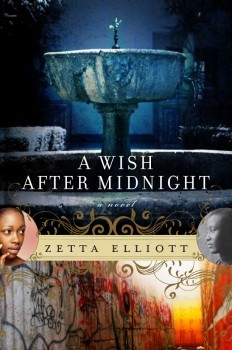 Digital books make it possible for readers around the world to avoid expensive delivery costs. A Wish After Midnight is on sale this month in the Kindle store for $0.99—if you don’t know about the NYC Draft Riots (which devastated the city from July 13–16, 1863), here’s your chance to learn more by reading my first historical fantasy novel. A friend told me yesterday that his niece in the UK loved The Ghosts in the Castle, and it will be required reading for Prof. Michelle Martin’s children’s literature graduate students as they tour England this fall. I’m planning to head back across the pond for my 45th birthday in late October, and my brother’s got me thinking about ringing in the new year in the Caribbean…so many seas to cross! And I still dream about New Zealand…
Digital books make it possible for readers around the world to avoid expensive delivery costs. A Wish After Midnight is on sale this month in the Kindle store for $0.99—if you don’t know about the NYC Draft Riots (which devastated the city from July 13–16, 1863), here’s your chance to learn more by reading my first historical fantasy novel. A friend told me yesterday that his niece in the UK loved The Ghosts in the Castle, and it will be required reading for Prof. Michelle Martin’s children’s literature graduate students as they tour England this fall. I’m planning to head back across the pond for my 45th birthday in late October, and my brother’s got me thinking about ringing in the new year in the Caribbean…so many seas to cross! And I still dream about New Zealand…
Okay, back to writing! Today’s task is learning about the colonial-era capital of Senegal, Saint-Louis…
July 1, 2017
children & libraries
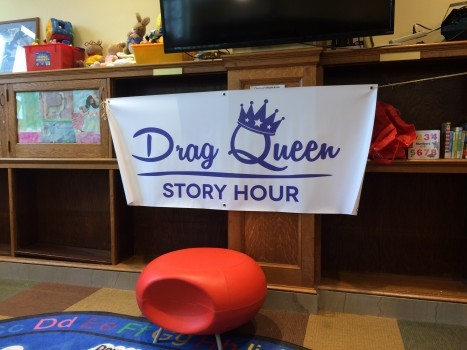 June is over and I managed to write just under 16K words. Not bad, but not enough to finish The Return. I took a break on Wednesday to write a new picture book story and for research purposes, went up to Harlem this morning to attend Drag Queen Story Time. Harmonica Sunbeam had a small group of rowdy boys and three quiet girls—and she handled them like a pro! I was very impressed and know just how it feels when you prepare for one age group and then show up to find kids of a different age.I had a chance to talk to the youth librarian and Harmonica afterward and understand now why I’m better at writing workshops and book talks. 300 kids in an auditorium? No problem—because that’s the same kind of dynamic as the classroom. But story time is a *performance* and Harmonica admitted that her experience onstage, improvising and reading her audience, helps when working with kids. Did the kids leave story time understanding what a drag queen is? No. But she was a great reader and did a fun activity with them afterward. Maybe that’s a start.
June is over and I managed to write just under 16K words. Not bad, but not enough to finish The Return. I took a break on Wednesday to write a new picture book story and for research purposes, went up to Harlem this morning to attend Drag Queen Story Time. Harmonica Sunbeam had a small group of rowdy boys and three quiet girls—and she handled them like a pro! I was very impressed and know just how it feels when you prepare for one age group and then show up to find kids of a different age.I had a chance to talk to the youth librarian and Harmonica afterward and understand now why I’m better at writing workshops and book talks. 300 kids in an auditorium? No problem—because that’s the same kind of dynamic as the classroom. But story time is a *performance* and Harmonica admitted that her experience onstage, improvising and reading her audience, helps when working with kids. Did the kids leave story time understanding what a drag queen is? No. But she was a great reader and did a fun activity with them afterward. Maybe that’s a start.
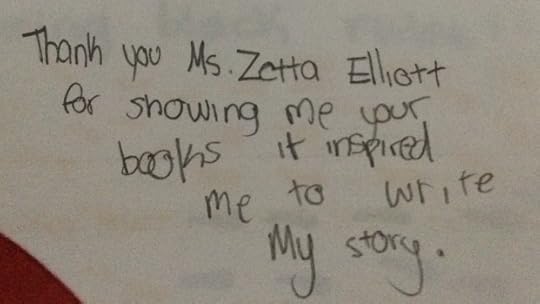 On Friday I received a stack of letters from the 3rd-5th graders I met last month at Explore Charter School. These are a few of my favorites. I’ve decided to use “the queen of books” as my professional title from now on.
On Friday I received a stack of letters from the 3rd-5th graders I met last month at Explore Charter School. These are a few of my favorites. I’ve decided to use “the queen of books” as my professional title from now on.
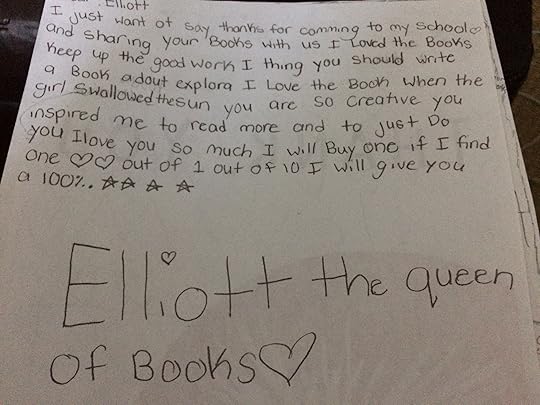
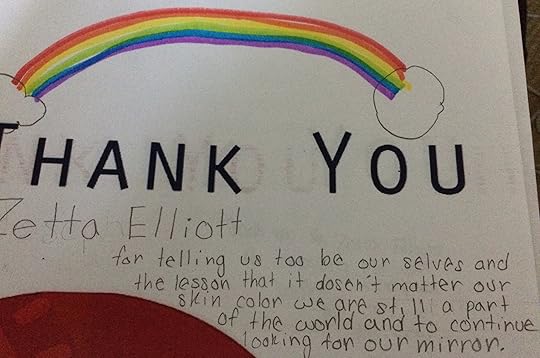 Last week I also learned that an article I wrote last fall about the inspiring week I spent in the Twin Cities was published in the summer issue of Children & Libraries, a publication of ALSC (Association for Library Service to Children). Here’s a short excerpt from “I Am Not Beyoncé:”
Last week I also learned that an article I wrote last fall about the inspiring week I spent in the Twin Cities was published in the summer issue of Children & Libraries, a publication of ALSC (Association for Library Service to Children). Here’s a short excerpt from “I Am Not Beyoncé:”
I’m grateful for every invitation I receive as an indie author because I recognize the risk a professor, librarian, or educator takes when he or she opens the door to someone deemed by many to be “not quite legitimate,” “unaffiliated,” and/or “too provocative.” The invitations I do receive invariably come from people who share both my commitment to social justice and my love for children from underserved communities who are also underrepresented in children’s literature.
A last-minute invitation is better than no invitation at all, right? I’ll be heading to Toronto at the end of this month for the biannual congress of the International Research Society for Children’s Literature (IRSCL). Our roundtable, “The Medium & the Messengers: Local Artists, Globalized Genres, and Transnational Audiences,” includes Shauntay Grant, Vivek Shraya, and Rukhsana Khan. It’s Canada Day today and I love that my Facebook feed is full of articles about #Resistance150 by First Nations activists:
#Resistance150: a project intended to highlight the many ways Indigenous peoples have historically resisted, and continue to resist, what many see as discriminatory and assimilationist policies of the Canadian government, such as those regarding pipeline construction, access to drinking water and child welfare funding gaps. Perhaps most importantly, the Indian Act itself.
I suspect my “Face in the Mirror” post from May is the reason I’m being invited—for the first time—to participate in this conference. I certainly haven’t been on any Canadian kid lit scholar’s radar for the past decade. As always, I feel anxious about heading back to Toronto, but the example of Indigenous artists helps me know that it’s not just okay but necessary to tell the truth about Canada—a country that’s progressive, but far from perfect…
June 21, 2017
protect your heart
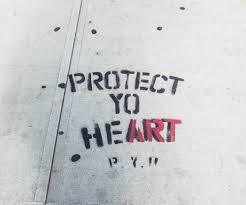 Those words are sprayed on the sidewalk not too far from my home, a useful reminder these days when the news is so bleak. I find myself tearing up a lot while scrolling through my Facebook feed so I think it’s time to take a step back. We’re close to having a finished cover for The Return; I had the cover art retouched and hope Nyla will appear a bit browner once the book prints (all art seems to print a few shades darker with CreateSpace). I’ve got four more chapters to finish; I hit my word goal (30K) but missed by mid-June self-imposed deadline. Some days I write over a thousand words and some days I don’t write at all. Trying to be gentle with myself, and trust that the
Those words are sprayed on the sidewalk not too far from my home, a useful reminder these days when the news is so bleak. I find myself tearing up a lot while scrolling through my Facebook feed so I think it’s time to take a step back. We’re close to having a finished cover for The Return; I had the cover art retouched and hope Nyla will appear a bit browner once the book prints (all art seems to print a few shades darker with CreateSpace). I’ve got four more chapters to finish; I hit my word goal (30K) but missed by mid-June self-imposed deadline. Some days I write over a thousand words and some days I don’t write at all. Trying to be gentle with myself, and trust that the 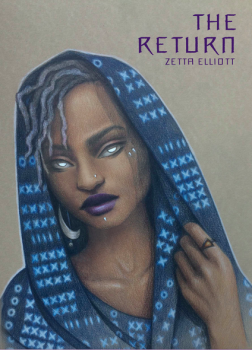 story will unfold in its own time. I’m eating vegan most days but overall I’d say I’m at 80% for the week (ice cream happened). Purple Wong has started working on Benny Doesn’t Like to Be Hugged and when I’m not writing, I’m reading long, complicated novels that take my mind off the many lives lost around the world this month.
story will unfold in its own time. I’m eating vegan most days but overall I’d say I’m at 80% for the week (ice cream happened). Purple Wong has started working on Benny Doesn’t Like to Be Hugged and when I’m not writing, I’m reading long, complicated novels that take my mind off the many lives lost around the world this month.
It’s the first day of summer! I’m heading to the park for a power walk and then maybe I’ll see a matinee later on if I get some writing done. Seeing art with a friend on Friday, taking a hike with another friend on Sunday…taking care of myself as best I can. Please do the same!
June 2, 2017
Social Justice Books
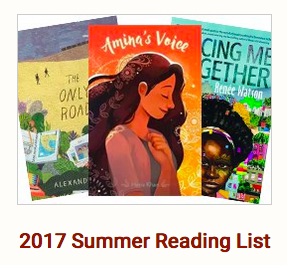 Avoid summer slide and make sure the kids in your life READ while school is out! Teaching for Change recently launched a new site, Social Justice Books, and you can find their 2017 Summer Reading List here. I’m honored that MILO’S MUSEUM is one of their recommended titles! They also have a guide to finding anti-bias books for kids, and you can also read reviews of the best (and worst) books. When educators and parents ask me where to find inclusive books for their kids, I send them to Teaching for Change because I trust Deborah Menkart and her team of reviewers to separate the wheat from the chaff…
Avoid summer slide and make sure the kids in your life READ while school is out! Teaching for Change recently launched a new site, Social Justice Books, and you can find their 2017 Summer Reading List here. I’m honored that MILO’S MUSEUM is one of their recommended titles! They also have a guide to finding anti-bias books for kids, and you can also read reviews of the best (and worst) books. When educators and parents ask me where to find inclusive books for their kids, I send them to Teaching for Change because I trust Deborah Menkart and her team of reviewers to separate the wheat from the chaff…
I’ve been reading a lot lately; I don’t post reviews on Goodreads, but I do track the titles I finish. Instead of rating a book, I’d much  rather reflect on my particular reading experience; I can appreciate and respect a book without enjoying it, and I can value originality and good storytelling even when the writing itself is lackluster. Sometimes a book has it all—like Katherina Vermette’s The Break—and then I urge everyone I know to read it. But I still don’t write a review, and maybe I need to reconsider that since I certainly appreciate readers who post reviews of my books online (this one just came in). Right now I’m reading NK Jemisin’s The Shadowed Sun and yesterday I finished Nnedi Okorafor’s Binti: Home. Both books make me very aware of my limitations as a writer. “I could never do that!” is a phrase I hear in my head again and again. But recognizing the strengths of others also makes me want to explore my own potential. I don’t think I’ll ever write science fiction; I’m not that interested in spaceships, alien species, and distant planets. But I’m fascinated by the way these women writers make science and technology appear meaningful and *organic* in the lives of Black people. I never thought I’d write a dystopian novel but I’ve got one underway right now. That’s why reading widely is so important—the more books I read, the more I realize that writers GROW, they evolve over time precisely because THEY KEEP ON WRITING. I don’t feel my books have to be perfect and that empowers me to finish up and move on without agonizing over small (or even
rather reflect on my particular reading experience; I can appreciate and respect a book without enjoying it, and I can value originality and good storytelling even when the writing itself is lackluster. Sometimes a book has it all—like Katherina Vermette’s The Break—and then I urge everyone I know to read it. But I still don’t write a review, and maybe I need to reconsider that since I certainly appreciate readers who post reviews of my books online (this one just came in). Right now I’m reading NK Jemisin’s The Shadowed Sun and yesterday I finished Nnedi Okorafor’s Binti: Home. Both books make me very aware of my limitations as a writer. “I could never do that!” is a phrase I hear in my head again and again. But recognizing the strengths of others also makes me want to explore my own potential. I don’t think I’ll ever write science fiction; I’m not that interested in spaceships, alien species, and distant planets. But I’m fascinated by the way these women writers make science and technology appear meaningful and *organic* in the lives of Black people. I never thought I’d write a dystopian novel but I’ve got one underway right now. That’s why reading widely is so important—the more books I read, the more I realize that writers GROW, they evolve over time precisely because THEY KEEP ON WRITING. I don’t feel my books have to be perfect and that empowers me to finish up and move on without agonizing over small (or even 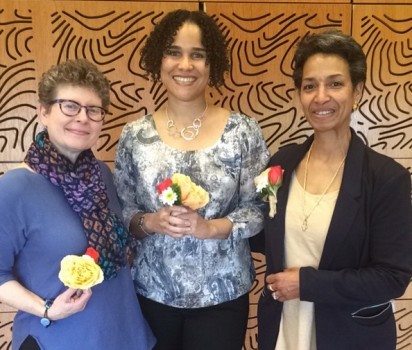 big) issues. Each time I finish a story, I learn more about myself as a writer and a reader. And I’m SO grateful that there are so many amazing women writers out there doing things I can’t do…yet.
big) issues. Each time I finish a story, I learn more about myself as a writer and a reader. And I’m SO grateful that there are so many amazing women writers out there doing things I can’t do…yet.
Today is one of my last gigs for the school year. I’m looking forward to talking about books with Joseph Bruchac at the Middle School Quality Initiative. Michele Weisman from Meet the Writers kindly invited me to present, and the 100 attendees will receive a copy of Ship of Souls. It feels like I wrote that book a lifetime ago, but it’s exciting to share my process and priorities with educators and administrators. I had the opportunity to talk about legacies at Weeksville Heritage Center with outgoing executive director Tia Powell Harris and Brooklyn Historical Society president Deborah Schwartz. I want to leave behind a body of work, but I also hope people remember that I took some chances—in my writing and my advocacy. I’m not fearless, but do hope to prove that there’s more than one way to be a writer who serves her community.
May 30, 2017
looking back, moving forward
 Yesterday I got serious about The Return. I’ve been working on this novella, off and on, for 3 years! I hired a cover artist, I’ve got another artist finishing the last interior illustration, and I’ve written about 20K words. I just need to make one final push to finish it by mid-June, and that means not getting distracted by other projects. I’ve got speaking gigs for the next 3 weeks but then my summer opens up…once I finish The Return, I can focus on my other novella North/South. Part of me wonders whether these projects could be sold to a traditional publisher and part of me just wants to go ahead and do my own thing. Having 4 full-color illustrations hikes the price of this follow-up to The Deep. Would you pay $20 for a paperback book? My comics friends tell me that’s the standard rate for a graphic novel, but this is a hybrid…CreateSpace charges as if you’re putting color on every page so that’s what jacks the price up–and that’s why I need to write less rather than more. Well, the task this week is to finish 3 of these 10 half-written chapters. Yesterday I drafted a new outline and printed it out so I can make notes as I work; I formatted the book twice, comparing font sizes; I inserted the four illustrations to see how they look; and I revisited the blog posts I wrote while I was in Dakar in 2014.
Yesterday I got serious about The Return. I’ve been working on this novella, off and on, for 3 years! I hired a cover artist, I’ve got another artist finishing the last interior illustration, and I’ve written about 20K words. I just need to make one final push to finish it by mid-June, and that means not getting distracted by other projects. I’ve got speaking gigs for the next 3 weeks but then my summer opens up…once I finish The Return, I can focus on my other novella North/South. Part of me wonders whether these projects could be sold to a traditional publisher and part of me just wants to go ahead and do my own thing. Having 4 full-color illustrations hikes the price of this follow-up to The Deep. Would you pay $20 for a paperback book? My comics friends tell me that’s the standard rate for a graphic novel, but this is a hybrid…CreateSpace charges as if you’re putting color on every page so that’s what jacks the price up–and that’s why I need to write less rather than more. Well, the task this week is to finish 3 of these 10 half-written chapters. Yesterday I drafted a new outline and printed it out so I can make notes as I work; I formatted the book twice, comparing font sizes; I inserted the four illustrations to see how they look; and I revisited the blog posts I wrote while I was in Dakar in 2014. 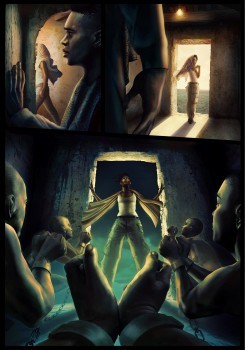 Yesterday Facebook pulled up photos from my trip to Ghana in 2013 and I was reminded how that trip to Elmina Castle really inspired The Return. I felt angry at Elmina but visiting the House of Slaves at Goree Island the following year was a very different experience. I want this novella to balance the rage, sorrow, and longing one experiences when visiting a slave fort. For me, it hurt, but it affects everyone differently. This is reflected in my cast of characters and I hope readers can relate to them.
Yesterday Facebook pulled up photos from my trip to Ghana in 2013 and I was reminded how that trip to Elmina Castle really inspired The Return. I felt angry at Elmina but visiting the House of Slaves at Goree Island the following year was a very different experience. I want this novella to balance the rage, sorrow, and longing one experiences when visiting a slave fort. For me, it hurt, but it affects everyone differently. This is reflected in my cast of characters and I hope readers can relate to them.
After binge-watching The Last Kingdom this past weekend (research for my Viking novel), I wrote a poem for a forthcoming anthology designed to help kids survive the Trump era. I’m sticking to my vegan diet and getting my steps in…next week I meet with my Random House editor, and Skype into the Los Angeles classroom where I passed out last month…I feel like I’m closing some of the many tabs that have been open for a while. Unstructured time can be tricky, but I’m learning to budget my time and feel optimistic about the summer. It’s time to close some doors so that others can open…
May 22, 2017
WORD! 2017
Join us at Restoration Plaza on June 11th for the 2017 Word Caribbean Lit Fest! Our young adult panel Younger Readers: A Brave, New World is at 4:30pm:
Award-winning Young Adult fiction writers journey to brave new worlds from Zetta Elliott (Canada/St. Kitts – Nevis), Mother of the Sea, historical saga from the coast of Africa to across the Atlantic, to magical realism and vodou culture in Ibi Zoboi (Haiti), American Street to Daniel José Older (USA/Cuba), Shadowshaper Cypher, with his complex, urban fantasy in summertime Brooklyn.
You can find the complete schedule here.
May 17, 2017
home again
 London was lovely! I came home with yet another cold and I’m hacking as I write, but it was good to get out of the US for a while. I’m always struck by how easy London feels—I traveled all over the city and went to Coventry and Cambridge, and didn’t feel anxious or unsure; something about the design of the city really works for me, and that no doubt contributes to how happy I feel when I’m there. It also helped that I met wonderful educators who
London was lovely! I came home with yet another cold and I’m hacking as I write, but it was good to get out of the US for a while. I’m always struck by how easy London feels—I traveled all over the city and went to Coventry and Cambridge, and didn’t feel anxious or unsure; something about the design of the city really works for me, and that no doubt contributes to how happy I feel when I’m there. It also helped that I met wonderful educators who 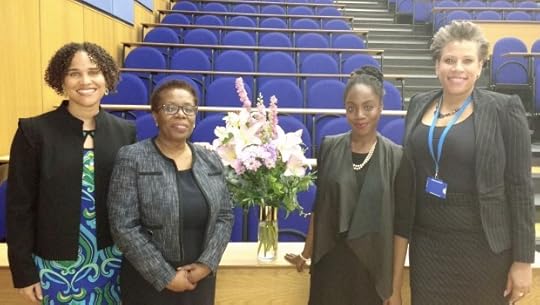 created opportunities for me to share my work with their students. I arrived Wednesday morning and stopped by the Museum of Natural History to say farewell to Dippy but the main hall was closed; got some soup and a cheese & pickle sandwich before heading back to the hotel to work on my law school talk. The next morning I went to East London to visit Ms. Russo’s class at the Petchey Academy—such wonderful young readers! I hustled back to the hotel and caught a train up to Coventry; it was great to meet such impressive Caribbean women lawyers and scholars, and our audience members were ready to debate the topic of cultural appropriation. I had a chance to sell some books afterward and then
created opportunities for me to share my work with their students. I arrived Wednesday morning and stopped by the Museum of Natural History to say farewell to Dippy but the main hall was closed; got some soup and a cheese & pickle sandwich before heading back to the hotel to work on my law school talk. The next morning I went to East London to visit Ms. Russo’s class at the Petchey Academy—such wonderful young readers! I hustled back to the hotel and caught a train up to Coventry; it was great to meet such impressive Caribbean women lawyers and scholars, and our audience members were ready to debate the topic of cultural appropriation. I had a chance to sell some books afterward and then  the conversation continued as we returned by train to London. I ordered a late night pizza and slept in the next day before heading up to Cambridge to hang out with Ana from The Book Smugglers. She gave me a tour of the historic colleges, and we talked about the intense labor and emotional energy that goes into publishing. Saturday was Open Day at the University of Roehampton and I received a warm welcome as soon as I arrived on campus. More books were sold and important connections were made before I dashed off to meet my friend Clare at the British Museum. I managed to see two more friends before heading to the airport on Sunday, and on the plane ride home I started composing the previous blog post calling for researchers around the world to track diversity in kid lit. I felt pretty awful on Monday because of this cold (and all the “issues” writing about Canada stirs up for me), so it was nice to get these colorful graphics from Matthew Smith at Reflection Press. Instead of looking at how many books we *don’t* have for Indigenous kids and kids of color, Maya and Matthew have calculated how many #ownvoices books we’d need to achieve parity:
the conversation continued as we returned by train to London. I ordered a late night pizza and slept in the next day before heading up to Cambridge to hang out with Ana from The Book Smugglers. She gave me a tour of the historic colleges, and we talked about the intense labor and emotional energy that goes into publishing. Saturday was Open Day at the University of Roehampton and I received a warm welcome as soon as I arrived on campus. More books were sold and important connections were made before I dashed off to meet my friend Clare at the British Museum. I managed to see two more friends before heading to the airport on Sunday, and on the plane ride home I started composing the previous blog post calling for researchers around the world to track diversity in kid lit. I felt pretty awful on Monday because of this cold (and all the “issues” writing about Canada stirs up for me), so it was nice to get these colorful graphics from Matthew Smith at Reflection Press. Instead of looking at how many books we *don’t* have for Indigenous kids and kids of color, Maya and Matthew have calculated how many #ownvoices books we’d need to achieve parity:
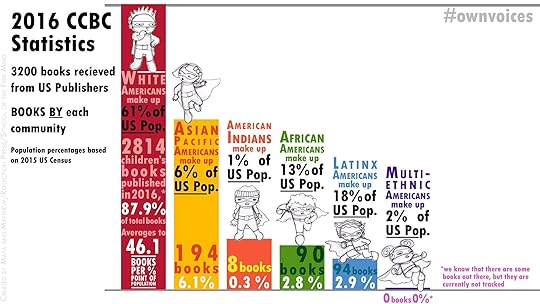
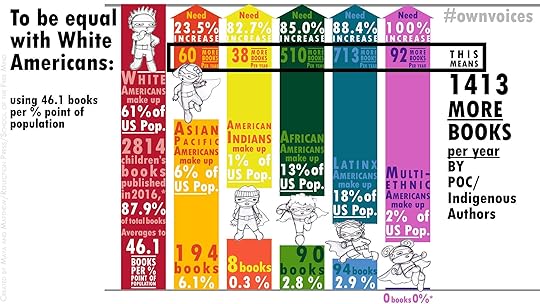 Of course, this isn’t likely to happen within the traditional publishing industry since it’s dominated by straight, White, cis-gender women without disabilities. I’m a little worried that if other countries agree to track diversity in kid lit, they’ll continue to treat books for kids as if they organically appear rather than being carefully curated. We have to look at the lack of diversity in the entire children’s literature community—librarians, teachers, reviewers, booksellers, editors, marketers, authors & illustrators, and kid lit scholars…
Of course, this isn’t likely to happen within the traditional publishing industry since it’s dominated by straight, White, cis-gender women without disabilities. I’m a little worried that if other countries agree to track diversity in kid lit, they’ll continue to treat books for kids as if they organically appear rather than being carefully curated. We have to look at the lack of diversity in the entire children’s literature community—librarians, teachers, reviewers, booksellers, editors, marketers, authors & illustrators, and kid lit scholars…
May 14, 2017
The Face in the Mirror
Every year I conduct dozens of presentations in public schools, on college campuses, and at libraries. As a self-published author I am not welcome in certain spaces within the kid lit community, but I am also an independent scholar and my academic credentials open some doors that might otherwise remain closed. I very much appreciate the invitations I do receive to share my particular point of view, and my most popular talk for adults focuses on community-based publishing as one solution to racial discrimination (and, more specifically, anti-Blackness) in the traditional publishing industry. Nothing supports my claim of White supremacy like the illustration commissioned in 2016 by Sarah Park Dahlen at St. Kate’s University. The graphic was inspired by Rudine Sims Bishop’s oft-quoted metaphor of children’s books serving as mirrors, windows, and sliding glass doors.
In addition to providing the 2015 statistics compiled by the Cooperative Children’s Book Center, the colorful illustration demonstrates how privilege is bidirectional; you can’t unfairly advantage one individual without simultaneously disadvantaging someone else. Artist David Huyck cleverly positions a White boy—blond-haired and blue-eyed—standing confidently in a room full of mirrors. Each shows him in a different heroic role: king, firefighter, astronaut. By contrast, the children of color and the Indigenous child have only one mirror each; their mirrors diminish in size, corresponding with the limited number of books published about their group. Unlike the White child, these kids are not beaming with joy and/or pride; instead they are downcast and clearly disturbed by the injustice perpetrated against them by those in the US publishing industry.
I have often wished that such a graphic existed for my country of origin. I grew up without “mirror books” and as a result often felt invisible and less valuable than my White peers. When I decided to become a writer at age thirteen, I initially wrote stories about Whites because almost all of the books I consumed featured White protagonists. It has taken years for me to decolonize my imagination, and I doubt I would have become an award-winning Black feminist author and scholar if I had remained in Canada (I left in 1994). I am also critical of my adopted home, but there are opportunities here in the US that simply don’t exist for Blacks in Canada. “The Great White North” prides itself on its diversity (a mosaic rather than a melting pot!), yet the reality often falls far short of the rhetoric around multiculturalism. Canada is a progressive place but it is far from perfect, and its proximity to the US too often results in a kind of smugness in Canadians that I find hard to bear. The apparent disinterest in collecting and publishing diversity data on children’s literature leads me to believe that no one in the Canadian kid lit community feels the effort is warranted. In fact, a 2016 article in School Library Journal celebrated Canadian publishers as leaders in the drive for greater diversity in children’s literature. But is such praise justified? My research on kid lit by and about Black Canadians suggests otherwise. Gathering and illustrating diversity data would provide a much-needed mirror, forcing the Canadian kid lit community to confront not only its successes but also its limitations and failures.
On a recent trip to London, I gave a presentation at the National Centre for Research in Children’s Literature at the University of Roehampton. After my talk, several people asked whether I believed the grim statistics on US kid lit were better or worse in the UK. I told them that I couldn’t say for sure, though I suspect the numbers are worse. What would happen if researchers around the world made a commitment to track diversity in books for young readers? How might scholarship in the field be enhanced by such data? A model for tracking racial diversity already exists—could other countries not replicate (and potentially improve upon and/or extend) the model established by the CCBC at the University of Wisconsin-Madison? What does it say about the profession that so many children’s literature scholars seem content to operate without an accurate understanding of disparities in the representation of their nation’s children? Greater transparency leads to increased trust; if publishers expect the public to believe they are committed to producing inclusive children’s literature, then it’s in their interest to submit their books for annual evaluation.
It’s time to hold up a mirror and take a good, hard look at the global kid lit community. As James Baldwin asserted, “Not everything that is faced can be changed. But nothing can be changed until it is faced.”

